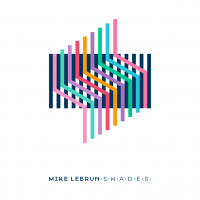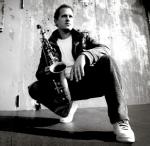All Music Guide (Adam Greenberg)
Young jazz tends to go one of two directions in common form — it can hold strictly to
playing through classic ideas as the players get the music of the greats ingrained
into them, or it can spin wildly out of control as the players show off their
instrumental mastery with little regard for a strong, original melody. The Chicago
quartet led by Josh Moshier (on outstanding keys throughout the album) and Mike
Lebrun (on sax) takes neither of the standard tacks. Instead, Lebrun and Moshier
craft straightforward but clever pieces of melody, then use the band as a whole to
ornament heavily around the themes.
Read more
All Music Guide (Adam Greenberg)
Young jazz tends to go one of two directions in common form — it can hold strictly to
playing through classic ideas as the players get the music of the greats ingrained
into them, or it can spin wildly out of control as the players show off their
instrumental mastery with little regard for a strong, original melody. The Chicago
quartet led by Josh Moshier (on outstanding keys throughout the album) and Mike
Lebrun (on sax) takes neither of the standard tacks. Instead, Lebrun and Moshier
craft straightforward but clever pieces of melody, then use the band as a whole to
ornament heavily around the themes.
Chicago Jazz Magazine (Philip Davia)
This new recording, which features all new compositions by highly talented
musician/composers Josh Moshier and Mike Lebrun, opens with “Kings Road.” The
piano figure is mysterious and sparse and there is great use of space and rhythm in
this piece. At certain points it has a very hip, avant-garde feel.
“Jambo” features a playful melody performed beautifully with the whole band
playing part. Guest guitarist John Moulder plays a perfectly executed and melodic
solo on this tune. “Saturnine,” which features an acoustic guitar and piano,
showcases Moshier’s modern composition and how very well the entire group plays
together.
While all the tunes are cleverly put together and beautifully executed, “The Second
Handers” shows a complex piece of music in both its harmonic movement and
rhythmic variety. The different sections move from one to the next with fiery solo
playing over a dynamic rhythm section. The tune hits a peak as it ends with guitar
and saxophone trading lines.
From the opening electric piano riff “Eleven Toe Waggle” is my favorite cut on this
disc. The piano riff becomes a motif throughout this tune. There are moments where
this repetitious figure is joyously mesmerizing, and at this point, Lebrun’s saxophone
launches into smooth and soulful solos.
The syncopation laid down by the entire group provides rhythmic variety that glues
this all together. This music is just damn good! “Avocado Soul” features the most
lush and beautiful piano accompaniment by Mr. Moshier. Lebrun plays a bluesy,
soulful sax solo over these most righteous chords. This is a subtle piece and it is
captivating. The electric piano returns in “Finally Done, Still Frustrated” with a
tremendous groove and a marvelous Robert Meier bass solo that had my foot
tapping throughout the tune.
While “Known Unknowns” features another soulful guitar solo over a complex and
freely moving harmony, Moshier plays a fine solo over his own composition. The
opening electric piano chords of “Sleepwalking” give way to a very modern piece,
but one that grooves throughout.
At times, the quartet sounds like a much larger band. Jazz could use more electric
piano and it sounds tremendous here with a funky groove by Krucoff supporting
Moshier’s hip solo lines. “Misfortunately Pleasant Opportunity” is a modern ballad.
It’s like nothing I’ve heard before. Both Moshier and Lebrun use space very
effectively and the tune is beautiful and harmonically interesting.
The disc finishes with the up-tempo, bebop groove of “Who Shall Excel Them.”
Robert Meier and Max Krucoff, as they do on every track, masterfully play through
many rhythmic sections of this piece. This CD offers new and complex compositions,
very melodic soloing, infectious grooves and a sense style which illustrates that the
future of jazz is in good hands.
Show less


























